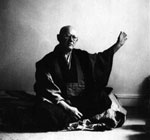UC Berkeley's
Bancroft Library adds archival collection of Beat poet Philip
Whalen's art, poems and notes
04
Dec 2000
By
Kathleen Maclay, Media Relations
Print
quality images of Whalen are available for download
|


Poet
Philip Whalen. |
Berkeley
- Archivists at the University of California, Berkeley's Bancroft
Library are busy cataloging 20 years' worth of notebooks filled
with the verse, illustrations and notes of Beat poet and Zen
monk Philip Whalen.
Librarians
are combing through the contents of nine overstuffed boxes
of journals, posters, correspondence, photos and writings,
as well as 77-year-old Whalen's personal library. With Whalen's
permission, the materials were retrieved by the Bancroft staff
from the basement of a San Francisco house where Whalen stored
his work. The residence is near the San Francisco Hartford
Zen Center, where Whalen lives. Comprising the bulk of the
collection are 62 handwritten notebooks produced by Whalen
from 1959 to 1979, a period generally considered his most
productive and creative.
"It's done
very neatly, also with doodles and drawings that are part
of the poems," said Leslie Scalapino of Oakland, a poet and
longtime Whalen friend. The notebooks contain the first drafts
of his poetry, "so in terms of studying his work, it's a gold
mine," she said.
"This is
a major coup for us. It's really quite a find," said Anthony
Bliss, rare books curator for The Bancroft Library.
Whalen
is author of more than 20 volumes of poetry, fiction, commentary
and interviews. His volumes of poetry include "On Bear's Head"
(Harcourt, 1969), "Canoeing up Carbaga Creek" (Parallax Press,
1996), "Scenes of Life from the Capital" (Cranium Press, 1970)
and "Overtime" (Penguin, 1999). Much of his work has never
been published, Bliss said.
Professor
Ron Loewinsohn of UC Berkeley's English department considers
Whalen "arguably the most underappreciated of the Beat writers."
"I think
his form is the most radical and the most subtle of all the
Beat poets," Scalapino said. Plus, the shy Whalen was less
social and gave fewer public readings of his work than many
other Beat poets, she said, adding, "He just had a more private
kind of life."
"He's a
shy, retiring sort of guy," Bliss said. "Not aggressive and
not pushy, and it's our loss that so much of his work remains
unpublished."
Whalen
lives as ordained Buddhist monk Zenshin Ryufu, which means
"Zen-mind-dragon-wind." He is legally blind and in poor health
caused by a longstanding infection involving his heart and
an artificial valve, said Scalapino.
Whalen
remains an avid reader, thanks to friends who read to him,
she said. He no longer writes poems, Scalapino said, "but
he speaks the way his poetry is."
Whalen
was on stage for the launch of the Beat Generation. It happened
at a San Francisco Marina District car repair garage-turned-art
space in September 1955 when Allan Ginsberg first read "Howl"
in public. On the bill with Ginsberg and Whalen were Gary
Snyder, Michael McClure and Philip Lamantia. Whalen is depicted
in Beat writer Jack Kerouac's "The Dharma Bums" as a character
named Warren Coughlin.
The Whalen
collection, highlighted by his calligraphic writing and illustrations,
complements the library's archival material of San Francisco
Poet Laureate Lawrence Ferlinghetti, owner of the City Lights
Bookstore and publishing company. Ferlinghetti encouraged
the disillusioned and rebellious Beats who emerged in the
1950s.
The new
archive will be a major resource for scholars researching
late 20th century art and literature, as well as fields such
as California or Bay Area writing, or San Francisco's literary
renaissance, Loewinsohn said.
"People
have attempted to compare Whalen's poems to mosaics or collages,
and while that's a useful approximation, his poems are really
more like mobiles," professor Loewinsohn wrote for an upcoming
Bancroft publication.
"The scenes
or sequences are suspended in relation to each other so that,
as you read past them, the relationships between the scenes
or sequences are constantly changing, like a mobile, whose
pieces are constantly moving in relation to each other."
Whalen's
poetry uses voices from all social levels and blends formal
and eloquent styles with the casual and slangy. He is abstract,
intellectual and extremely sensual, Loewinsohn said, and seeks
to share the sacramental nature of the world with his readers.
Born in
Portland, Oregon, and raised in The Dalles, Oregon, Whalen
earned his bachelor of art degree at Reed College in Portland,
where he was a classmate and roommate of poet Gary Snyder.
It was there that he learned calligraphy from faculty member
Lloyd Reynolds, who taught art history and creative writing.
Reynolds also was well known for promoting calligraphy.
###
Print
quality images of Whalen are available for download
.
|